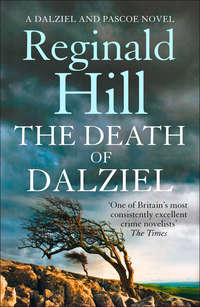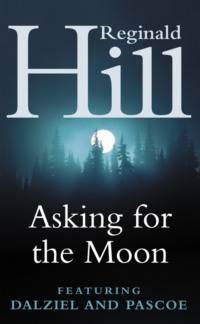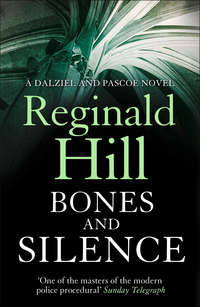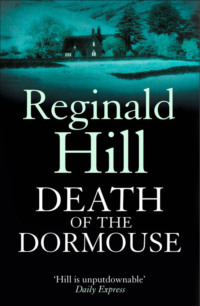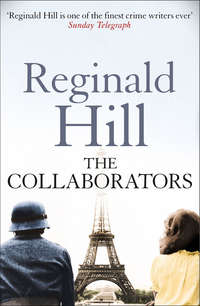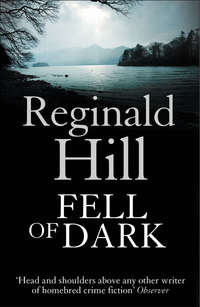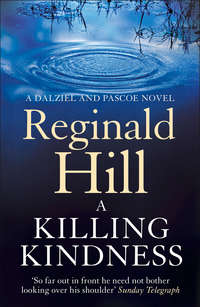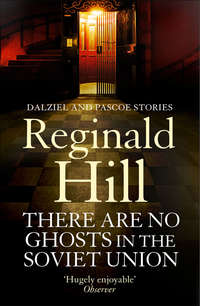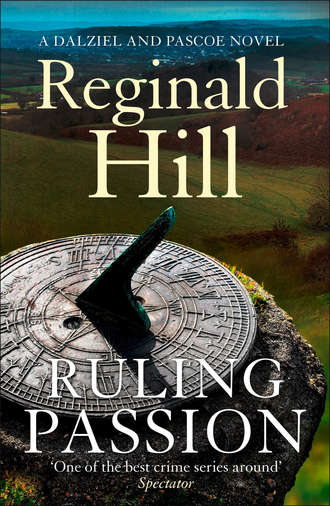
Полная версия
Ruling Passion
His wife, a craggy woman whose outward semblance belied her good-heartedness, took one look at Ellie on her arrival at the station and led her into the kitchen for tea and sympathy. Ellie had deteriorated rapidly under the treatment (a necessary process, well understood by Mrs Crowther) and by the time Pascoe came away from Backhouse, she had been given a mild sedative by the doctor and removed to a bedroom.
Doctor Hardisty, a rangy, middle-aged man whose unruly grey hair gave him a permanently distraught look, met Pascoe at the kitchen door. They had encountered once already at Brookside Cottage.
‘You all right?’ he now asked diffidently.
‘Fine,’ said Pascoe. It wasn’t altogether a lie. The act of signing the coolly formulated statement had produced a temporary catharsis. Momentarily the morning’s discoveries had been reduced to the status of a ‘case’. He even found himself prompted to question the doctor about his examination of the bodies, but decided against it. Hardisty was the local man, living and practising in the village. By now the bodies would be on their way to the mortuary and the probing knife of the pathologist.
By now Timmy and Carlo and Rose would be on their way …
He nipped the thought off smartly.
‘Miss Soper?’ he asked. ‘How is she?’
‘Resting upstairs. I’ve given her something.’
‘May I see her?’
‘If she’s awake. It’s straight ahead on the landing.’
Pascoe turned and began to climb the stairs.
Ellie opened her eyes as he came through the door. Her dress was draped tidily over a chair and she lay under a patchwork quilt in her slip.
‘OK, love?’ said Pascoe, taking her hand.
‘Doped to the back teeth,’ she said. ‘I don’t want to sleep. It’s always worse remembering when you wake up.’
‘You’ve got to sleep,’ he said gently. The sight of her lying there so palely moved him almost as deeply as the discovery of the three corpses had done.
She nodded as though he had performed some feat of subtle persuasion, and closed her eyes. But as he opened the door to leave, she spoke again.
‘Peter,’ she said. ‘Where’s Colin? He’s got to be told.’
‘It’s all in hand,’ he said reassuringly. ‘Sleep now.’
On the stairs he felt dizzy and had to pause, leaning heavily on the banister. It was certainly in hand, the business of finding Colin. But the searchers’ motives were far from humane.
‘You OK, Sergeant?’ said Backhouse from the foot of the stairs. He sounded more concerned than the doctor had done.
‘Yes sir,’ said Pascoe, descending.
‘Miss Soper asleep?’
‘I think so.’
Backhouse looked closely at him, his thin scholarly face solicitous, assessing.
‘I’m going back to the cottage. The lab boys should be finished now. I wondered if you felt up to coming with me. I’d appreciate your assistance.’
The ghost of a grin flitted involuntarily over Pascoe’s lips at this semi-formal courtesy. Fat Dalziel, his own superintendent, must have missed out on this part of the senior officers’ training course.
‘Certainly, sir,’ he said.
Some minor telepathy must have operated. As they climbed into the waiting car, Backhouse said, ‘I’ve been talking to Mr Dalziel on the phone.’
‘Oh.’
‘He was naturally sorry to hear what had happened.’
Naturally. But I bet the sod didn’t make the normal polite distressed noises. Backhouse was doing a translation job.
‘He says you’re too important to be spared past the week-end, but I would appreciate what help you can give me in that time.’
Appreciate again. He was being given kid-glove treatment. You didn’t have to be a detective to work out why. But let them say it. He was damned if he was going to broach the matter.
Them. With surprise Pascoe realized that he was thinking of the police as them.
‘Stop here,’ said Backhouse to his driver. The car pulled up outside a high-roofed, pebble-dashed building with narrow, church-like windows. A well-kept notice advertised that this was Thornton Lacey Village Hall. Beneath the gold and black lettering a typewritten sheet supplied the menu of activities that could be sampled in the hall during the current week. Last night, for instance, the Village Amenities Committee had met. And tonight the Old Time Dancing Group was scheduled to waltz, fox-trot, two-step, and polka its way down Memory Lane. But the light fantastic would have to be tripped somewhere else, thought Pascoe as he followed Backhouse into the building.
The large musty-smelling room was full of activity. Shirt-sleeved policemen were arranging tables and two Post Office men were fixing up telephones. All the lights were on to supplement the meagre ration of sunlight the windows let in.
‘The station’s too small,’ said Backhouse. ‘Especially if this turns into a large scale operation. Which I hope it won’t.’
He glanced sideways at Pascoe, then looked quickly away. A uniformed inspector came to meet them.
‘Anything new?’ Backhouse greeted him.
‘Just a couple of things, sir.’
The inspector glanced assessingly at Pascoe, then led Backhouse away to the far end of the hall. Pascoe thought of following. He was desperately keen to discover what was going on but also very conscious of his ambiguous position. He was merely a witness, he had no official standing here.
‘What the hell’s going on here?’
The interrupter was a big man, barrel-chested and strong-jawed. He was wearing a polo-necked sweater and jodhpurs. Pascoe felt sorry for the horse that would have to carry that bulk which he estimated at fifteen stone. It was all pretty solid stuff. The man was in his forties but still a long way from turning to flab.
‘Well? Come on, man. Who’s in charge?’
Backhouse’s attention had been caught and he came across to meet the man.
‘Good morning, sir,’ he said. ‘I’m Detective-Superintendent Backhouse. And you …?’
‘Angus Pelman. What the hell are you up to?’ asked the man in a rather more moderate tone.
‘We’re conducting a murder inquiry, sir,’ responded Backhouse. ‘I’m surprised you haven’t heard.’
Yes, that is surprising, thought Pascoe. Over two hours had elapsed since the crime had been reported. He had no doubt that shortly – perhaps already – the TV cameras would be rolling and the press-men patrolling around Brookside Cottage. But Angus Pelman had contrived to remain ignorant till he entered the hall.
He was also contriving to look completely taken aback at the news. When Backhouse filled in a few details, he sat down violently on the nearest chair.
‘The Hopkinses at Brookside Cottage?’ he repeated incredulously.
‘You knew them, sir?’ asked Backhouse.
‘I should do,’ Pelman answered. ‘I sold them the damned place.’
A memory started up in Pascoe’s mind, beautifully clear. The cottage in Eskdale, six (or was it seven?) years ago. The owner had been a farmer who lived half a mile down the valley. He was a big, randy bastard, full of himself, and he took to dropping in from time to time – exercising his right of inspection, he claimed, though his main objects of inspection were clearly the two girls, particularly Rose. They suspected also that he visited the place while they were out walking on the fells. In the end they did something, some kind of joke … but the memory faded as quickly as it had come. He would have to ask Ellie.
‘Shot, you say? Both shot?’ said Pelman.
‘Not both the Hopkinses, sir. Mrs Hopkins, and their two guests.’
‘And Colin Hopkins?’
‘We hope to contact him soon, sir.’
‘You mean, he doesn’t know? But he was around yesterday evening. I saw him in the village.’
Suspicion dawned, followed by outrage.
‘You’re not suggesting he had something to do with it, are you? Man, you’ve got to be mad. I haven’t known him long, but it’s out of the question!’
Suddenly Pascoe liked him a lot better.
‘We’ve reached no conclusions yet, sir,’ answered Backhouse reasonably. ‘By the way, if you weren’t expecting to find us here, why did you come in?’
Pelman looked puzzled.
‘Why did I …? Oh, here you mean. Simple. I’m the chairman of the Amenities Committee; we had a meeting last night and on the morning after these meetings, the secretary brings the minutes along here. She’s got them typed out by then. We check through them together, then pin them up on the notice board so that everybody can see what’s been going on.’
‘Nice,’ said Backhouse approvingly. ‘Nice.’
He was looking towards the door as he spoke, and Pascoe, following his gaze, was uncertain whether he was commenting on the democratic process or the woman who stood there.
She was nice, if you liked that kind of thing. Early thirties, well groomed brown hair, expensively but quietly dressed, good figure; Pascoe had no objection to any of these. But he felt himself antagonized by her look of amused self-possession as she surveyed the scene.
Upper-middle class, certain of her place in the scheme of things, full of common sense and good works, committee woman, is or will be a magistrate, cardboard cut-out of the good Tory MP’s wife, or even the good Tory MP. Complacent bitch.
Pascoe was surprised at the violence of his thoughts. And at the ridiculous speed of his entirely intuitive analysis. There was a spring of rage in him which would have to be tapped with the greatest care. He tried to wipe the slate clean and start again with this woman, but she seemed bent on confirming his conclusions.
‘Hello, Angus,’ she said in a clear, high-pitched, well-educated voice. ‘You’re well protected. The minutes aren’t that explosive, I hope.’
She came forward holding a leather folder in her hand. So this was the secretary of the Amenities Committee. That figured.
‘Hello, Marianne. Haven’t you heard?’
Pelman briefly told her what had happened. As he spoke, Pascoe observed the woman keenly. Two important members of the village community and neither had heard the news. He would have to revise his ideas about the tribal nature of the English village.
‘Would you like a seat, Mrs … er …?’ asked Backhouse politely as Pelman finished.
‘Culpepper,’ supplied Pelman.
‘Thank you,’ said the woman. She did not look too overcome to Pascoe’s jaundiced eye, but then her upbringing probably laid great stress on the stiffness of upper lips. It worked both ways. She placed the leather folder on a nearby table, but it slipped and fell open to the floor. Pascoe picked it up and stood with it in his hands, glancing down at the neatly typewritten sheets. He took in the topmost of them with the casual ease of a thousand-words-a-minute man. It seemed to have been a lively meeting, mainly centred on the alleged pollution of the stream which ran through the village. Downstreamers suspected upstreamers of having inefficient or even extra cesspools. Upstreamers vehemently denied this. The water in question was presumably the brook which ran behind Brookside Cottage. The sundial in the garden rose vividly in his mind. Only the sunny hours …
‘I’ll take that,’ said Pelman, seizing the folder from Pascoe’s unresisting hand. ‘We won’t hold you up any more, Superintendent. Come on, Marianne. Let’s get you a stiff brandy in the Bird.’
Exit John Wayne with the lady, thought Pascoe as the jodhpured man steered Marianne Culpepper doorwards by the elbow. She gently disengaged herself before passing out into the street.
‘Put someone on that door,’ said Backhouse mildly, ‘before they establish a right of way. I’ll be at the cottage.’
He motioned Pascoe to move out before him, and let him wait by the car while he exchanged a few more words with the inspector. The street was surprisingly empty. The sun had grown warm as the morning progressed, but Pascoe shivered from time to time as he waited for Backhouse to come and start the short journey back to Brookside Cottage.
Chapter 3
Their driver parked the car on the grass verge about forty yards from the cottage. The assortment of vehicles scattered in the immediate vicinity prevented a closer approach.
Three or four newspapermen intercepted the superintendent as he walked along the road. Locals mainly, Pascoe assessed. It was still too soon for anyone to have emerged from the chaos of Saturday morning London. But they would do. Three dead from shotgun wounds was too big to leave in the hands of a local runner.
Backhouse dealt with them kindly but firmly. No, there were no developments yet. They were looking for a man who might be able to help them with their inquiries. Mr Colin Hopkins, yes, that was him. A photograph and description might be issued if it was felt to be necessary.
Pascoe had dropped behind as the questioning proceeded. When Backhouse and his interrogators stopped in front of the cottage, he found himself, deliberately blank-minded, looking up the side of the building between the garage and the wall. There was activity in the back garden and beyond. They would be looking for the weapon. Everything they found would be carefully scrutinized, of course, but it was the weapon they were hoping for. It made a difference if you knew the man you were searching after didn’t have a shotgun in his possession.
He doubted if they’d find it so near. Hurled in panic into the woods over the stream, it would have been found by now. Whereas if the killer were cool enough to make a more deliberate attempt to hide it, he would surely wait until his car had taken him a safe distance from the village.
The killer. He tested himself gently from the vantage point of disembodied objectivity he had scrambled on to in the last two hours. Was he ready yet to consider whether Colin … why Colin …
No. He wasn’t quite ready. He walked up to the garage and peered in. What he saw surprised him.
‘Sergeant!’ Backhouse called authoritatively. Pascoe instinctively obeyed the summons and had joined the superintendent at the threshold before he started wondering about the tone of command. A new step in the psychology of their relationship perhaps. A reminder of his official subordination.
Or perhaps his service with Dalziel had made him too suspicious of all detective-superintendents’ motives. Perhaps all Backhouse was doing was using his police rank as a red herring to divert the interest of the newspapermen from him. Clearly, as they moved off in a friendly, almost light-hearted, little group, they had no suspicion that the discoverer of the crime was so close.
In the cottage, much had changed. No effort had been made to tidy up after the rigorous search and fingerprinting examination which had taken place. Why bother when there was no chance of an irate householder turning up to complain?
Backhouse thought differently.
‘For God’s sake, Hamblyn,’ he said to the ginger-moustached detective who came to greet him, ‘get this place tidied up. And those cars outside. If I want a road-block here, I’ll ask for it.’
‘Yes, sir,’ said Hamblyn unemotionally.
‘Anything new?’
‘Nothing useful, sir. Not as far as I can see. Anything on the car yet, sir?’
‘I’m afraid not.’
Pascoe spoke lowly, diffidently.
‘There’s a car in the garage,’ he said. It sounded daft as he said it but, hell, he had to say it. Not that it was possible they wouldn’t have looked. Was it?
‘Yes, yes; I believe there is,’ said Backhouse. Then he laughed.
‘Oh, I see your dilemma. Yes it’s true the Hopkinses’ car is in the garage. But it’s the other one we’re interested in. Royal blue Mini-Cooper according to best report. The one Mr Rushworth and Mr Mansfield arrived in.’
Pascoe was abashed. Hamblyn was looking at him with faint distaste.
‘Let’s step into the garden,’ said Backhouse, like a kindly host desirous of stirring his guest’s digestive juices before lunch.
They went through the dining-room, passing the chalked body-outlines and ringed bloodstains, and out of the french window into the garden, halting near the sundial.
I’m really getting the treatment, thought Pascoe. What does he expect from me? Colin’s present address?
‘The Hopkinses’ car was in the garage, the visitors’ car on the driveway,’ said Backhouse. ‘This is the arrangement you’d expect and this is what the few people we’ve found who passed early last evening saw.’
‘They couldn’t see into the garage,’ objected Pascoe.
‘True,’ said Backhouse. ‘Now, here’s what happened, or what possibly happened supported by a strong scaffolding of what did happen. There was a lot of broken glass scattered around here. Did you notice? From a whisky bottle, that was easy enough to establish. Were they hard drinkers, your friends?’
‘Only on occasions,’ answered Pascoe, recognizing the start of interrogation. ‘And the occasion rarely merited the expense of scotch. But that was years ago. Things change.’
‘Yes. Of course. Well, we’ve got a thorough house-to-house on now, but the first place my men called was the Eagle and Child, the second the Queen Anne. That’s where she bought it.’
‘The whisky?’
‘That’s right,’ said Backhouse pensively. ‘At about quarter to nine last night. Curious that. The Eagle and Child’s nearer. No matter. The landlord’s wife, who sold it to her at the off-licence counter, didn’t see the car, but heard it drive away. She reckons it sounded more like the Mini-Cooper than the Hopkinses’ Cortina.’
‘A good ear,’ commented Pascoe, watching a pair of thrushes which had decided the policemen were harmless, and were drilling for worms.
‘No doubt we’ll find someone to corroborate it,’ said Backhouse. ‘As things stand, it seems likely that they started drinking after dinner. When the scotch began to get low, Mrs Hopkins volunteered to fetch more; she used her visitors’ car as it would have to be moved anyway to get her own out. On her return she either walked straight into the garden or went through the front door into the lounge, then the dining-room and out of the french windows.’
‘And then she was shot,’ said Pascoe.
‘It seems likely. Very soon after she came back. She was still holding the full bottle, you see. We found the cap with the seal complete. She must have held the bottle in front of her, either to ward off the shot or to use as a weapon. The blast from the shotgun went right through it. There were splinters of glass embedded deep in the wound. Would any of your friends own a shotgun, do you think?’
‘I don’t know. I just don’t know,’ said Pascoe irritably. ‘I’ve told you, Superintendent, this was a kind of reunion. I hadn’t seen these people for years. How should I know what they were likely to do now?’
‘Do people change that much?’
‘They change all right. When someone’s put a couple of ounces of lead pellets into your face, you change!’
Pascoe realized he was nearly shouting. Jesus, he thought, I should be back there too, lying on one of Constable Crowther’s comfortable beds with some of Doctor Hardisty’s comfortable pills inside me.
‘Sir!’ It was Hamblyn from the french window. Behind him stood two men.
‘It’s Mr French, the coroner, sir.’
‘Hello, Superintendent,’ said the taller of the two men who now stepped into the garden. He was over six feet, rather gaunt of feature, well tanned, his nose showing the pale indentations left by a frequent wearing of spectacles. His companion was a good nine inches shorter, less dramatic in every way, but his pale oval face was intelligent and far from weak. Both men wore casual, sporting clothes, French going in for bright colours, his companion much more subdued.
‘Sorry to take so long. You must have thought I’d be first on the spot, living on the doorstep so to speak. But I was half-way round the golf-course with Culpepper here. Dreadful business, this. Dreadful. You’d better tell me what I need to know.’
Culpepper, thought Pascoe, as Backhouse and the coroner moved back into the cottage together. The committee secretary – Marianne Culpepper. Her husband?
The man spoke to him and his words seemed to confirm this. His eyes were taking everything in. Despite his air of quiet authority, he felt a need to explain himself.
‘Excuse me, could you … You are with the police, I’m right?’
‘Pascoe, sir. Sergeant Pascoe.’
‘It’s not just morbid curiosity that brings me here, Sergeant. I live close by. I knew these people, the Hopkinses, I mean. When Mr French told me why he had to come back, I couldn’t believe it.’
He fell silent.
‘How close do you live, sir?’ asked Pascoe. It was easier to fall into the policeman role than explain his true position.
‘About half a mile. Round the side of the hill.’ He gestured vaguely towards the rising ground which lay to the south of the village.
‘What happened here, Sergeant? Is it true they are all dead?’
‘Mrs Hopkins is dead, sir,’ said Pascoe evenly. ‘And Mr Mansfield and Mr Rushworth, two guests who were spending the night with them.’
‘Oh, my God. What about Colin, Mr Hopkins? And the other guests?’
‘Other guests?’ said Pascoe sharply.
‘Yes. I ran into Mrs Hopkins in the village yesterday evening when I got back from the office. About five o’clock. It seems impossible … anyway, I asked them round for a drink tonight, but she explained they would have a houseful of guests. Four, she said. At least.’
It had been five-thirty when Pascoe had rung to say he and Ellie couldn’t make it that evening. If only that case hadn’t come up … or Dalziel hadn’t insisted … another two made the odds very strong against anyone trying anything with a double-barrelled shotgun. What an adaptable thing blame was; so easy to shift or attract.
‘Had you known Mr and Mrs Hopkins long, sir?’ asked Pascoe, evading the question about the guests.
‘Not long. Two or three months only, since they bought Brookside, in fact. They have worked so hard on it. The place was not in a good state of repair when they acquired it, you know. And they did wonders, wonders.’
He tailed off into silence.
‘Mr Pelman sold them the cottage, I believe,’ said Pascoe.
‘That’s right.’
Something in his tone made Pascoe pursue this line.
‘Did he live here himself before he sold the place?’
Culpepper smiled without much humour.
‘No. The cottage stands at the boundary of the land he bought when he came here five years ago. His house is the other side of the woods, his woods. That’s what he really wanted, of course. A place where he could pit his wits against the intelligence of various small beasts and birds. A most uneven contest, I fear.’
Am I supposed to be too thick to get the double irony? wondered Pascoe.
‘It’s strange, isn’t it, that the chairman of the Village Amenities Committee should let such a property fall into disrepair?’ murmured Pascoe.
Culpepper raised his eyebrows at him.
‘You glean your information fast, Sergeant.’
‘We spend our working life amidst the alien corn, sir.’
Culpepper suddenly nodded twice, as though something had been confirmed.
‘You’re the Hopkinses’ policeman friend, aren’t you? One of their week-end guests.’
Clever Mr Culpepper.
‘Yes. I am. How did you know?’
‘Mrs Hopkins, Rose, said something about you, when we talked yesterday.’
So I was an object of interest, worth a special mention. Like a literary lion. Or a two-headed man. What now, Mr Culpepper? wondered Pascoe. Indignation at my mild deceit?
‘I’m sorry. I didn’t realize. This must be an unbearable situation for you,’ said Culpepper with apparently unforced sympathy. ‘Were you here when it happened?’
‘No,’ said Pascoe shortly. ‘I found them this morning when we arrived.’
‘How terrible. You say we?’
‘A friend. She’s resting now. It was a shock.’
‘Terrible. Terrible. Such things are a puzzle and a torment to the mind.’


